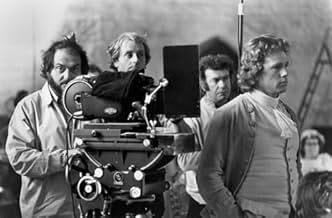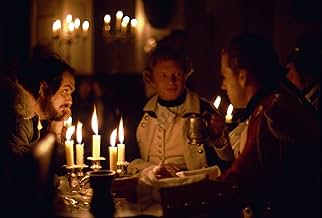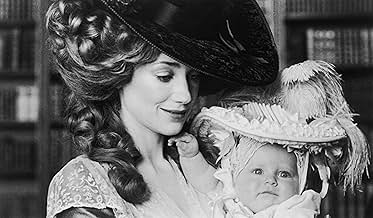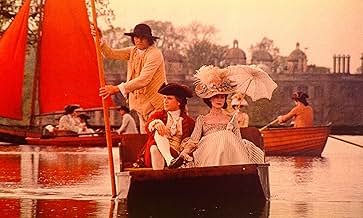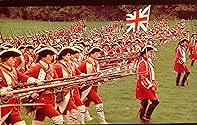En Angleterre au dix-huitième siècle, un Irlandais malhonnête gagne le coeur d'une veuve riche et assume la position aristocratique de son mari décédé.En Angleterre au dix-huitième siècle, un Irlandais malhonnête gagne le coeur d'une veuve riche et assume la position aristocratique de son mari décédé.En Angleterre au dix-huitième siècle, un Irlandais malhonnête gagne le coeur d'une veuve riche et assume la position aristocratique de son mari décédé.
- Director
- Writers
- Stars
- A remporté 4 oscars
- 17 victoires et 14 nominations au total
Hardy Krüger
- Capt. Potzdorf
- (as Hardy Kruger)
Diana Körner
- Lischen - German Girl
- (as Diana Koerner)
André Morell
- Lord Gustavus Adolphus Wendover
- (as Andre Morell)
Sommaire
Reviewers say 'Barry Lyndon' is acclaimed for its breathtaking cinematography, intricate period details, and masterful use of natural light, often likened to fine art. It explores themes of human folly, the quest for wealth and status, and the resulting downfall. However, some criticize its slow pace, the perceived lack of emotional depth in characters, especially Ryan O'Neal's performance, and its lengthy runtime. Despite these drawbacks, many regard it as a significant artistic achievement and a standout in Kubrick's oeuvre.
Avis en vedette
The beauty, the depth, and the mystery of this film are unsurpassable - what Kubrick was doing with light is just a miracle. Special lenses were designed to shoot interiors and exteriors in natural light. In one scene Barry (Ryan O'Neil) was having a dinner with a German woman who was feeding her baby and the candle light made the whole scene look like a Caravaggio's painting. This is just one of many scenes. Each of them is perfection and harmony. Costumes and sets were crafted in the era's design. Age of Enlightenment with its gallantry, wars, and duels, had been recreated in the film with the precision of the celebrated landscape and portrait masters of the period such as Thomas Gainsborough; Sir Joshua Reynolds, founder of the Royal Academy of Arts; George Romney to name just a few. If nothing else, watching BL is pure aesthetic delight - and there is one man who responsible for it, Stanley Kubrick. If ever divine film was made, "Barry Lyndon" was it and Kubrick could've quoted the Bible - "God looked at everything he had made, and he found it very good".
I've read the comments and articles that call "Barry Lyndon" cold, slow, boring, "the collection of pretty pictures', "flawed" masterpiece, and the most ridiculous one, "glittering ornament with a hollow center". I simply can't understand it. "Barry Lyndon" is the most compelling and compassionate realization of the inevitable finality of everything in this world which was presented by the visionary director with elegant sensual melancholy. Stanley Kubrick known for his detached, seemingly remote and non-sentimental style chose to reach out to his viewer directly during the epilogue, "It was in the reign of George III that the aforesaid personalities lived and quarreled, good or bad, handsome or ugly, rich or poor, they are all equal now". I don't recall any other movie that would illustrate the old wisdom, "everything will pass" in such sublime and deeply moving way.
I've read the comments and articles that call "Barry Lyndon" cold, slow, boring, "the collection of pretty pictures', "flawed" masterpiece, and the most ridiculous one, "glittering ornament with a hollow center". I simply can't understand it. "Barry Lyndon" is the most compelling and compassionate realization of the inevitable finality of everything in this world which was presented by the visionary director with elegant sensual melancholy. Stanley Kubrick known for his detached, seemingly remote and non-sentimental style chose to reach out to his viewer directly during the epilogue, "It was in the reign of George III that the aforesaid personalities lived and quarreled, good or bad, handsome or ugly, rich or poor, they are all equal now". I don't recall any other movie that would illustrate the old wisdom, "everything will pass" in such sublime and deeply moving way.
10Spleen
In fact it's one of Kubrick's most gripping pictures, with a narrative drive second only to that of "Dr. Strangelove" (and it's unquestionably a more glorious creation than, say, anything he made in the 1950s). English director Michael Powell (while attributing a similar failing to one of his own works) says that Kubrick fell into "the trap of the picturesque", but while I admire Powell as a creator, the judgment is absurd: at the VERY least, each lush image shows us people not just occupying a part of the screen but inhabiting a world, and tells us much about their relation to that world. Many shots are indeed amazing and beguile the eye, but they don't have the effect they do simply because they would make nice postcards.
THIS, I feel sure (without having read Thackeray), is the proper way to adapt a long story from novel to screen. Each scene is either allowed as much time as it needs to make its point and its impact, or it's cut altogether - you won't catch Kubrick skating too quickly over his material for no better reason than to fit it all in. The third-person narration (consisting of witty, beautifully crafted sentences - it's about time I did read Thackeray) almost performs a kind of dance with the images, gliding in just when we need it, taking a step back when we don't. (So rarely is even third-person narration used so well.) And as always, Kubrick's musical sense is unerring. My impression at the time was that I was listening to mid-eighteenth century music that gave way to pieces from the classical era as the hero started to move in higher and higher circles. I was more or less right. But then I noticed Schubert's name in the credits - and I realised with a start that I'd been listening to, had even started tapping my feet to, a Schubert piece I was familiar with, without the anachronism registering.
It's a pity Kubrick stopped making epics after this. Look at the ones he's responsible for: "Spartacus" (not a project Kubrick was fond of, admittedly, but still the most magnificent of all Roman epics) "2001" (the most magnificent of ALL epics), and "Barry Lyndon". The last of the three is by no means a poor cousin.
THIS, I feel sure (without having read Thackeray), is the proper way to adapt a long story from novel to screen. Each scene is either allowed as much time as it needs to make its point and its impact, or it's cut altogether - you won't catch Kubrick skating too quickly over his material for no better reason than to fit it all in. The third-person narration (consisting of witty, beautifully crafted sentences - it's about time I did read Thackeray) almost performs a kind of dance with the images, gliding in just when we need it, taking a step back when we don't. (So rarely is even third-person narration used so well.) And as always, Kubrick's musical sense is unerring. My impression at the time was that I was listening to mid-eighteenth century music that gave way to pieces from the classical era as the hero started to move in higher and higher circles. I was more or less right. But then I noticed Schubert's name in the credits - and I realised with a start that I'd been listening to, had even started tapping my feet to, a Schubert piece I was familiar with, without the anachronism registering.
It's a pity Kubrick stopped making epics after this. Look at the ones he's responsible for: "Spartacus" (not a project Kubrick was fond of, admittedly, but still the most magnificent of all Roman epics) "2001" (the most magnificent of ALL epics), and "Barry Lyndon". The last of the three is by no means a poor cousin.
The genius Stanley Kubrick has truly outdone himself by crafting this masterpiece. After viewing A Space Odyssey, I thought there were no films more beautiful, but the breathtaking painting-like scenes of Barry Lyndon paired with music exquisitely chosen by Kubrick are simply stunning. There are some who may say that this film is too long or stale, but I say, that this film must be savoured slowly, and that one must enjoy it for what it is, which is almost like a series of ethereal paintings, one after another. Watch this film not for the end, but watch it and live with the fact that every scene is a part of the whole, and that the wholeness and oneness in itself is beautiful. Say, if we only watched movies for the ending, then composers who only wrote finales would be the greatest. All you must do is to simply sit down and relax, then, nothing else except absolute enchantment can possibly follow.
Some movies - I wish there were more of them - simply look like a series of great paintings. This film has that look. You could freeze-frame many of the scenes and swear you were looking at a Gainsborough, a Vermeer, a Hogarth or similar work of art by one the great artists of three to five centuries ago. It's just beautiful.
For that, we have Director Stanley Kubrick and Photographer John Alcott to thank. Being a three-hour movie, there are plenty of wonderful shots to admire, too. In addition, the costumes are lavish and authentic and the scoring is notable. It's no accident that Oscars were garnered for art/set direction, cinematography, costume design and scoring. Yeah, if you enjoy classical music, you'll really enjoy the soundtrack, too, under the guidance of conductor Leonard Roseman.
Not to be overlooked is the fine acting and the interesting and underrated story. I say "underrated" because this film, from what I've read, bored a lot of people and and it was a box-office flop. That's too bad because, frankly, I found the story (outside of the first 10--15 minutes) to be fascinating. As I watched, I kept wondering what strange occurrences will happen next to the lead character, "Redmond Barry/Barry Lyndon," played beautifully by Ryan O'Neal. (For most of the movie, he's called "Redmond Barry," so I will refer to him as that.)
Overall, this was a low-key adventure story about the rise-and-fall of a "scoundrel" back in late 18th century Englishman. "Mr. Barry" is an Irishmen living in England who winds up dealing with a number of people: Irish, English, Prussian, French. His dealings with these people are bizarre at times. While he mainly is shown doing what he can to promote himself, for either monetary gain and prestige of a name and power, he's not all bad. There is a compassionate side to him, but it only shows itself in small doses. It makes him all the more interesting to watch, because you don't always know how he's going to react to his circumstances, which change radically every few years.
We witness his rise to prominence and then his fall when his "sins begin to find him out," as the Bible would describe. It's quite a roller coaster ride.
This is an emotional, involving story, and a feast for the eyes and ears. It's quite different, too, certainly not the average fare from Kubrick. I can only hope this comes out on a high-definition disc some day. Admirers of this film need to see this in all its glory.
For that, we have Director Stanley Kubrick and Photographer John Alcott to thank. Being a three-hour movie, there are plenty of wonderful shots to admire, too. In addition, the costumes are lavish and authentic and the scoring is notable. It's no accident that Oscars were garnered for art/set direction, cinematography, costume design and scoring. Yeah, if you enjoy classical music, you'll really enjoy the soundtrack, too, under the guidance of conductor Leonard Roseman.
Not to be overlooked is the fine acting and the interesting and underrated story. I say "underrated" because this film, from what I've read, bored a lot of people and and it was a box-office flop. That's too bad because, frankly, I found the story (outside of the first 10--15 minutes) to be fascinating. As I watched, I kept wondering what strange occurrences will happen next to the lead character, "Redmond Barry/Barry Lyndon," played beautifully by Ryan O'Neal. (For most of the movie, he's called "Redmond Barry," so I will refer to him as that.)
Overall, this was a low-key adventure story about the rise-and-fall of a "scoundrel" back in late 18th century Englishman. "Mr. Barry" is an Irishmen living in England who winds up dealing with a number of people: Irish, English, Prussian, French. His dealings with these people are bizarre at times. While he mainly is shown doing what he can to promote himself, for either monetary gain and prestige of a name and power, he's not all bad. There is a compassionate side to him, but it only shows itself in small doses. It makes him all the more interesting to watch, because you don't always know how he's going to react to his circumstances, which change radically every few years.
We witness his rise to prominence and then his fall when his "sins begin to find him out," as the Bible would describe. It's quite a roller coaster ride.
This is an emotional, involving story, and a feast for the eyes and ears. It's quite different, too, certainly not the average fare from Kubrick. I can only hope this comes out on a high-definition disc some day. Admirers of this film need to see this in all its glory.
In terms of story this is on the surface at least, the simplest thing Kubrick ever made. However in terms of the technical aspect, it must have been one of his most challenging. The plot is basically about how greed, arrogance and ignorance can easily become the ruin of a man. The story itself is well told, but mostly quite simple as I said. The humor keeps us interested in the story, as does its undeniable visual beauty. It is not a stretch to say that this must be among the most beautiful looking films ever made. Every scene is filmed in all natural light, whether it be by sun or fire, and the landscapes and architecture handpicked by Kubrick himself are amazing. As in all Kubrick films, so much attention to small details equates to a great result in the end. Spielberg himself has called this film "possibly the most beautifully shot film in history.".
In terms of story, it's entertaining, in terms of it's technical achievement, the film is a landmark. Even for all the story's simplicity, there is a startling statement in the film that certainly can give the viewer real pause and thought. The finality of this world, the equality of all things in the end. It is certainly an interesting, powerful and very humbling down to earth observation. It is the kind of worldly observation that could perhaps lead some people to ruin, and yet lead others to strive for perfection. Perhaps that is part of Kubrick's thinking here, a Kubrickian challenge if you will, as he certainly was always an artist that was challenging his viewers. That through this observation people may become more aware of what they're leaving behind in this world...as one day, we will all equally be gone. For all the things written about this film, it is probably not nearly as unimportant of a story as many critics have said of it. Then again, critics and moviegoers alike have long been trying to catch up to Stanley, and never the other way around. 8.5/10.
In terms of story, it's entertaining, in terms of it's technical achievement, the film is a landmark. Even for all the story's simplicity, there is a startling statement in the film that certainly can give the viewer real pause and thought. The finality of this world, the equality of all things in the end. It is certainly an interesting, powerful and very humbling down to earth observation. It is the kind of worldly observation that could perhaps lead some people to ruin, and yet lead others to strive for perfection. Perhaps that is part of Kubrick's thinking here, a Kubrickian challenge if you will, as he certainly was always an artist that was challenging his viewers. That through this observation people may become more aware of what they're leaving behind in this world...as one day, we will all equally be gone. For all the things written about this film, it is probably not nearly as unimportant of a story as many critics have said of it. Then again, critics and moviegoers alike have long been trying to catch up to Stanley, and never the other way around. 8.5/10.
Le saviez-vous
- AnecdotesProduction was moved from Ireland to England after writer, producer, and director Stanley Kubrick received word that his name was on an I.R.A. hit list for directing a movie featuring English soldiers in Ireland. Consequently, several scenes were dropped.
- GaffesThe narrator states, early on, "About this time, the United Kingdom was in a state of great excitement". The United Kingdom came into being in 1801, when it merged with the Kingdom of Ireland, before which it was known merely as the Kingdom of Great Britain. In fact the Act of Union of 1707, which joined England and Scotland, refers to "the United Kingdom of Great Britain" or "the United Kingdom" throughout the text. "United Kingdom" was in common use at the time of the film.
- Citations
Title card: [End title card] EPILOGUE
Title card: It was in the reign of George III that the aforesaid personages lived and quarreled; good or bad, handsome or ugly, rich or poor they are all equal now
- Autres versionsThe 2011 Blu-ray plastered the opening Saul Bass variant of the Warner Bros. Pictures logo with the black and white WB shield.
- ConnexionsEdited into Hai-Kubrick (1999)
- Bandes originalesPiano Trio in E-flat, Op 100 (second movement)
Composed by Franz Schubert
piano: Anthony Goldstone
cello: Moray Welsh
violin: Ralph Holmes
Meilleurs choix
Connectez-vous pour évaluer et surveiller les recommandations personnalisées
Détails
- Date de sortie
- Pays d’origine
- Langues
- Aussi connu sous le nom de
- Баррі Ліндон
- Lieux de tournage
- sociétés de production
- Consultez plus de crédits d'entreprise sur IMDbPro
Box-office
- Budget
- 11 000 000 $ US (estimation)
- Brut – à l'échelle mondiale
- 548 798 $ US
- Durée
- 3h 5m(185 min)
- Couleur
- Mixage
- Rapport de forme
- 1.66 : 1
Contribuer à cette page
Suggérer une modification ou ajouter du contenu manquant




